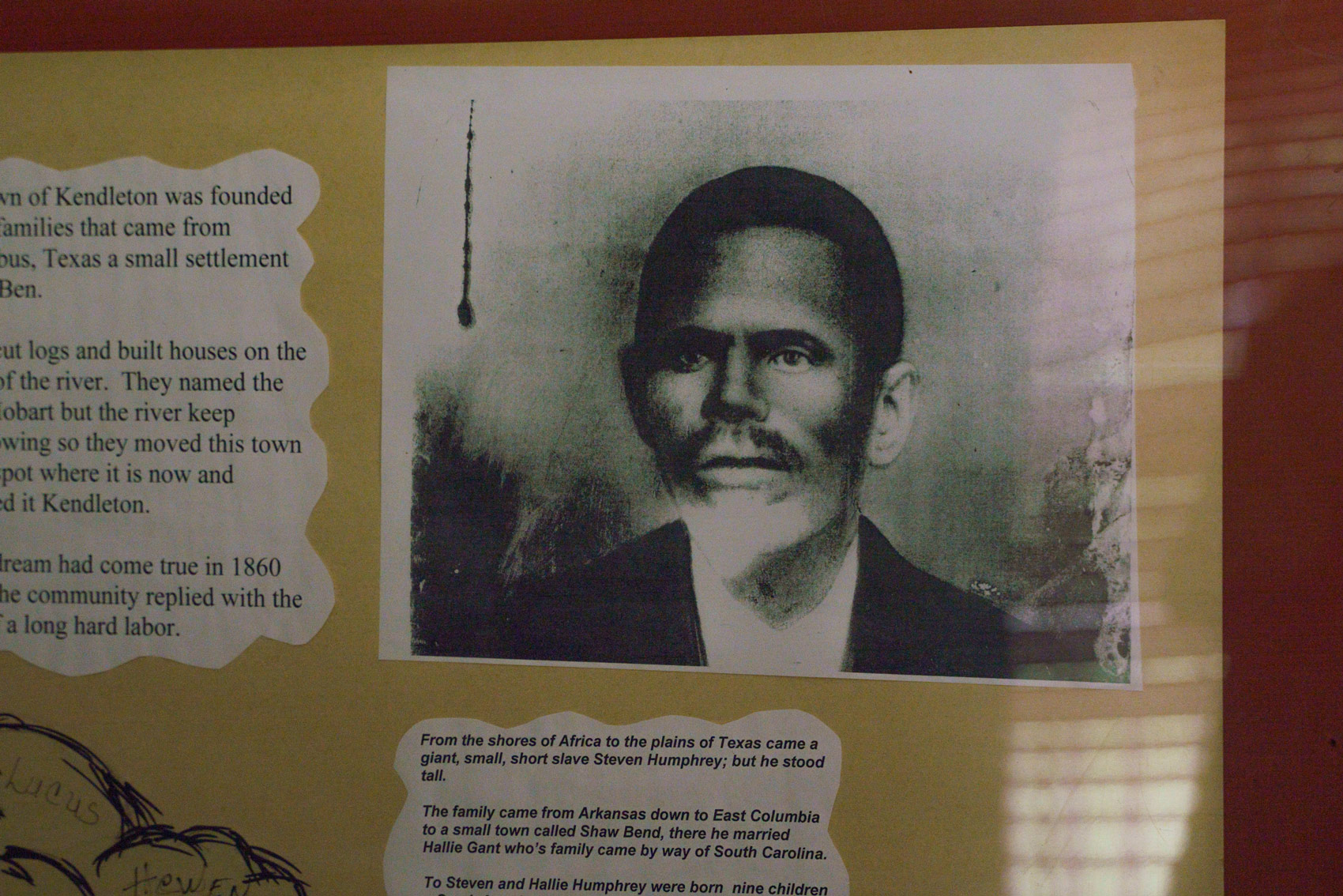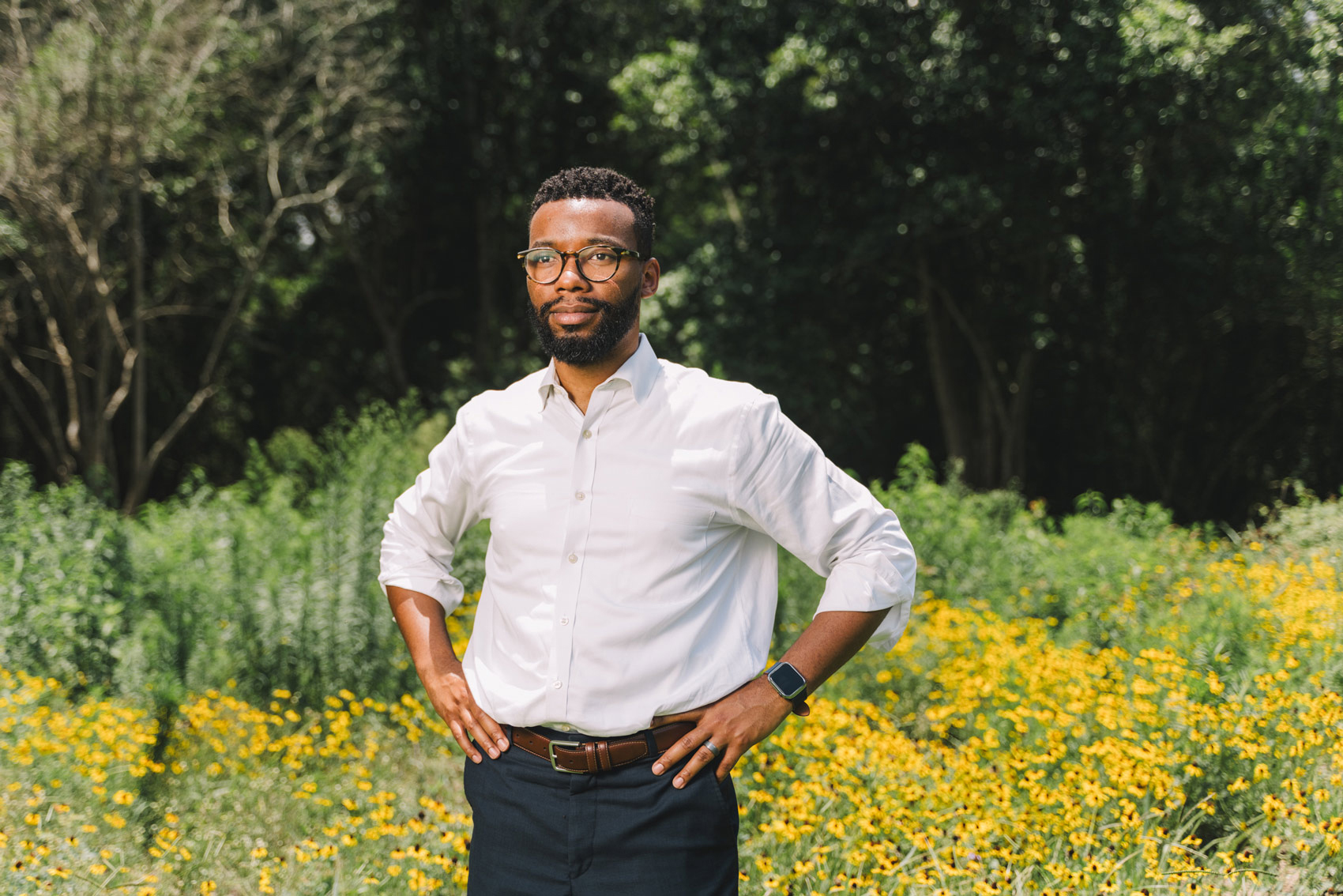|
Getting your Trinity Audio player ready...
|
KENDLETON — A large heavy stone is the only thing that keeps the headstone of Benjamin Franklin Williams, a former slave, clergyman and the first Black Texas legislator, upright.
“It just serves as some extra support, but right now it’s barely holding on,” said Fort Bend County Pct. 4 Commissioner, Dexter McCoy, as he gently placed his foot on the stone Thursday afternoon at Bates Allen Park.
It was the last remaining stone on the site of the historic St. John’s Missionary Baptist Church in Missouri City after an arsonist set it ablaze in 2006, McCoy said, and was brought there by former U.S. Rep. Pete Olson in honor of Williams’ Methodist faith. Although the stone is historic in its own right, McCoy does not consider it a “respectable” way to honor the significance of Williams or the other Fort Bend County trailblazers interred there, who were instrumental in the settlement and development of Kendleton.

But that will soon change thanks to a landmark $10 million project that will preserve and redevelop two dilapidated historical freedmen’s burial sites into an African American memorial. County officials, community leaders as well as direct descendants and family members of those buried on-site originally planned to celebrate Juneteenth Wednesday morning by breaking ground on the historic project. But the celebration has been postponed for a later date due to impending weather.
The memorial will sit on 36 acres in the 236-acre Bates Allen Park, redesigning the Newman Chapel Cemetery and the Oak Hill Cemetery into walking trails and reflection spaces for visitors to learn more about the history there. Officials say it will also commemorate the contributions of African Americans in the county and the state.
Part of that includes highlighting stories of the descendants of Kendleton, a historic freedmen's town, like Barbara Jordan, the first Black woman to serve in the Texas Senate and the first Black state senator in Texas since 1883, and Walter Moses Burton, the first Black sheriff in U.S. history.
‘Long overdue’
“It’s long overdue,” said Leo Humphrey, a board member of the neighboring Fort Bend County Heritage Unlimited Museum, who has at least four relatives buried on the site.
Humphrey recalls the routine trips he and his mother would take twice a year to clean up his relatives’ gravesites. Now at 81, he still comes out at least once a month to clean them, wiping them down to prevent mold and mildew. Sometimes he even brings his grandchildren to pass on the tradition and tell them stories of his grandparents and great aunt who are buried there.
“Each time I come down here I feel my ancestors who walked these trails and who had a hard time trying to get to a place in life where they could try to relax,” Humphrey said. “When we get this done I think their spirit in heaven will rejoice to see that their great grandchildren come to try to make sure that they were remembered.”

He never thought the day would come when a memorial would be built, given the site’s neglect after the six formerly enslaved families who bought the property and founded the town known as Kendleton lost the property in a tax sale. Clement Allen purchased it in 1910 to farm the land and passed it down to his son Bates Allen, whom the park is named after, according to the Fort Bend Herald.
Although families and descendants never forgot about their loved ones, the loss of ownership made it difficult to maintain the site. The Allen family occasionally allowed some family members on the property to care for their ancestors’ graves, but the majority of the time, they couldn’t get access to the fence-enclosed property.
“They ran cattle through the cemetery, and they broke up a lot of the headstones,” said Doretha Spencer, the president of the Fort Bend County Heritage Unlimited Museum, who also has family members buried there — some of whose headstones are lost.
“They say that they had years of neglect, but the cemetery was not open where the Blacks could go in and do anything or keep it up, because they were barred from it.”
Like Humphrey, Spencer didn’t think a day like this would come, but she’s ecstatic that it has.
“It means all the world to us that something is being done,” she said. “(It’s) like retribution for the things that we’ve gone through. That means a lot.”
Eventually the Allen family donated the property to Fort Bend County, and although the county is not obligated by statute to maintain the sites, McCoy said, it’s about doing what’s morally right and restoring dignity to those interred there.
“It does not reflect any sort of condition that I would want to be buried in, and certainly not the historic figures in our community. And so that's what we're trying to correct,” said McCoy whose precinct encompasses the park. “The county has a responsibility in this matter, because this is on county-owned property, and we should be doing better by those folks married here and their families. We have to.”
How it started
An initial $4 million investment for the project was funded from the 2020 parks bond project and an additional $6 million of funding from the 2023 parks bond will go towards the initial phase of the project which includes maintenance of the site, discovering missing gravesites and the installation of the walking trails at one of the cemeteries: Newman Chapel Cemetery.
Phase one of the project is expected to be completed by the end of next year, with hopes to raise additional private funding to eventually expand the memorial to include a memorial dedicated to acknowledging Fort Bend’s history with lynching, a two-story learning center and preserve the second cemetery site, Oak Hill Cemetery.

McCoy expects the memorial to be a huge future economic driver for tourism in the county and attract visitors from across the region and the country. But ultimately what excites him most is the opportunity for future generations growing up in Fort Bend County to their history. As a Black man who grew up in Fort Bend County, McCoy said, he had little knowledge of the area’s Black history until later in his adult life with the unearthing of the remains of 95 Black inmates found in Sugar Land on Fort Bend Independent School District’s property. He hopes the memorial negates that from becoming a future reality for Black kids growing up in the area.
“I think about the little kid like me who didn’t know his own story in the place where he lived and what that meant for how he viewed himself and his value,” McCoy said. “Knowing the consequential roles people who look like him have played in building the community we all enjoy today, I hope that kid is empowered by the legacy that was laid before him because we did this work.”


